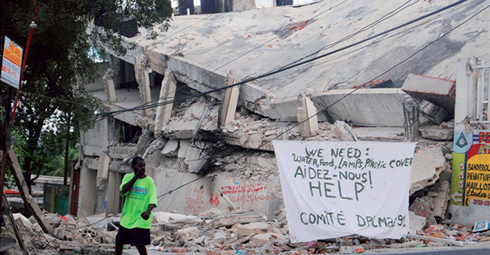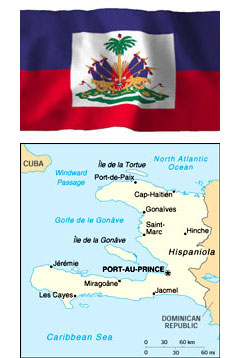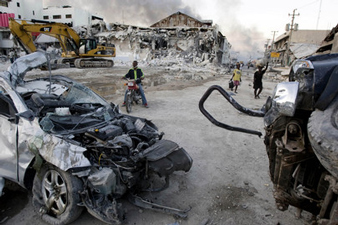Shameless shell games hurting Haiti?
By Saeed Shabazz -Staff Writer- | Last updated: Jan 14, 2013 - 11:11:19 PMWhat's your opinion on this article?
Three years after devastating earthquake, searching for money and progress in the Black Republic

Many are asking why resources and plans to rebuild Haiti 3 years after a large earthquake hit the Caribbean nation January 12, 2010.
|
UNITED NATIONS (FinalCall.com) - “Why is Haiti reconstruction not happening, all the money that went to the United Nations, the Red Cross and the international NGOs. Where’s the money? That’s what we have been asking from the beginning,” says Amadi Ajamu, a spokesperson for the Brooklyn-based December 12th Movement.
In an interview, Ms. Ajamu joined the ranks of activists, observers and analysts reflecting on little progress the Caribbean nation has made over the past three years. A 7.0 earthquake devastated the island of nine million people January 12, 2010, killing hundreds of thousands and leaving 1.5 million homeless.
Amnesty International, in a report released Jan. 11, says, “The housing situation in Haiti is nothing short of catastrophic.” The human rights organization urged the international community to make housing a priority, estimating 350,000 people still live in 496 camps across Haiti. Living conditions are “worsening” with a severe lack of access to water, sanitation and waste disposal, the group warned. The report is available at www.amnesty.org/en/news/haiti-three-years.
“I know we all are concerned about the fates of more than 300,000 displaced Haitians, who continue to live in makeshift camps,” says UN Secretary-General Ban Ki-Moon Jan. 11, calling on the international community to continue its support for Haiti. Mr. Ban, in an address that was delivered by the head of UN Peacekeeping during a ceremony in Haiti, argued there was a “keen sense of the progress that has been achieved in reconstruction and recovery over the past three years.”
“What progress?” asks Alex Main rhetorically. Mr. Main is a policy analyst and senior associate for international policy at the Washington, D.C.-based Center for Economic and Policy Research.
The problems cited on Day One of Haiti’s crisis exist today: “Poor coordination on the ground that affects UN cluster issues in Haiti such as Internally Displaced Persons and water sanitation,” says Mr. Main.
The Center for Economic and Policy Research joined early planning meetings in Haiti and there was a huge disconnect between the United Nations and non-governmental organizations with the Haitian grassroots, he tells The Final Call. “A pretty consistent problem–the disconnection—which has caused Haitian institutions to grow weaker,” Mr. Main says.

|
There has been “a total lack of transparency; the money appears to be pouring in, but you can’t find it, apparently they don’t want us to know,” he adds. The center’s latest report “Haiti Relief & Reconstruction Watch: Haiti’s Increasingly Hidden Displacement Disaster” was released Jan. 7.
“What’s at work here is Disaster Capitalism—whereby for-profit corporations as well as the international NGOs flock like vultures to devastation and seek to build the distress of others to build up their power and finances,” Prof. Bill Quigley, a professor of law at Loyola University at New Orleans and associate legal director at the Center for Constitutional Rights, says in an e-mail to The Final Call. “The rights of the Haitian people have not been protected,” he adds.
Erzili Danto, founder and president of the Connecticut-based Haitian Lawyers Legal Network, argues Haiti has suffered from three years of the “shock doctrine” of “U.S. occupation with a UN front.”
“They help throttle justice for Haitians, put bandages on plunder, helping to prolong Black and indigenous world suffering. UN plans for Haiti are not solutions. The UN is the problem,” declares Ms. Danto.
At issue are billions of dollars in post-earthquake aid pledged towards the recovery and reconstruction of the Caribbean island during a March 2010 International Donors Conference. According to the website of the Office of the Special Envoy for Haiti’s Recovery Pledge Summary (haitispecialenvoy.org), $9.27 billion was pledged with $5.33 billion to be disbursed in the first 18 months after the earthquake.
The OSE shows that through 2012, $2.84 billion had been disbursed and just eight of 12 major donors contributed about 70 percent of aid disbursed from 2010 to 2012. The report lists payouts of $1.47 billion in 2010, $959.4 million in 2011, and $404.9 million in 2012. “Of the $2.84 billion disbursed from the 2010 donors’ conference, an estimated 18.5 percent has been disbursed to the government of Haiti,” the OSE said.
A deputy spokesperson in the office of the UN secretary-general told The Final Call it would be “difficult to navigate” the maze of data concerning how money for Haiti was disbursed.

Haitians walk through the earthquake-ravaged streets of downtown Port-au-Prince, January 29, 2010. Photos: unmultimedia
|
It seems the press is not the only entity finding it difficult to figure out the UN’s aid regime for Haiti. The government of Canada announced Jan. 4 it too was confused about how $1 billion in aid to Haiti had been disbursed. Canada says all aid will be suspended for now.
On Jan. 8, Haiti Prime Minister Laurent Lamothe told reporters in Port-au-Prince he had just talked with Canada’s ambassador about the need for more direct interaction with the Haitian government on how Canadian aid would be spent, particularly on infrastructure projects.
“If and when Canada decides to resume, we ask that Ottawa focus on the priorities of the Haitian government,” Prime Min. Lamothe said, according to reports.
“There is still a long road ahead for the reconstruction the masses in Haiti have not felt the relief effort. A lot of funds were used by the international organizations strictly for show—for public relations presentations,” says Rev. Calherbe Monel of Virginia-based Christian Ministries. Rev. Monel told The Final Call his last visit to the island was in September.
“The Haitian administration is very smart in now engaging the international aid organizations directly; thereby eliminating the long disrespect shown by these groups towards President Martelly as they push their agendas,” Rev. Monel said.
The Washington, D.C.-based Center for Global Development, a think tank that researches and analyzes how rich nation’s policies impact people in the developing world, publishes a Haiti report in early January in Counter Punch. One of the most telling statements in the report: After three years, the government of Haiti received only 10 percent of the monies disbursed by the OSE, while Haitian organizations and businesses received one percent.
The Final Call contacted the office of the spokesman for the UN secretary-general, asking who received the other 90 percent of the money? The spokesman said that information may only be released by the OSE. A spokeswoman for the OSE said she would only speak on background, not on the record, and could only send a graph showing where the money went. The graph shows only “$4.01 billion was disbursed between 2010-2012, and that First Recipients were International Organizations, Government of Haiti and Haitian NGOs.” There is no percentage breakdown, or other specific data showing how the funds were spent.
The Final Call contacted the World Bank, the entity designated by the UN to disburse the aid to Haiti.
According to a World Bank spokeswoman, the Haitian Reconstruction Fund is now designated to make decisions on the spending of aid monies. “The HRF was set up at the request of the Government of Haiti. It is governed by a Steering Committee that is chaired by the Minister of Economy and Finance and consists of representatives of major donor organizations; and observers from Haitian civil society, International NGOS and the Diaspora,” according to the World Bank.
Over the first two years, the Steering Committee had met eight times and decided to allocate $274 million for 17 reconstruction activities, the report says. The World Bank communicated with The Final Call by e-mail. The World Bank also charges nearly 10 percent in fees for handling the funds.
“Everybody is talking about aid, and at the end of the day, we find out that it is actually loans; and our tax money is used to pay it back, at a higher interest rate,” says Pierre Laborissiere, co-founder of the Haitian Action Committee. “The word must go out that these donor entities are keeping the Haitian people under control by destroying the grassroots economy,” he tells The Final Call.
Jean-Robert LaFortune, a Haitian activist, adds, “We knew from the outset that the UN was not going to be a positive process. The world body is doing the same thing in Haiti that is doing in Iraq, Afghanistan and Africa. There is no policy from the UN that would give power-to-the-people; and there is no place for us at the table.”
Related news:
Haiti: Two years after deadly earthquake, life largely unchanged (FCN, 01-19-2012)
Leader urges Caribbean to unite for progress; calls for end to political disunity for good of the region (FCN, 12-20-2011)
Nation of Islam purchases water purification unit for Haiti (FCN, 01-11-2011)
A concrete way to provide long-term support for Haiti (FCN, 11-17-2010)
Recalling the past, advocates skeptical of pledges to help suffering Haitian people (FCN, 04-09-2010)
The story of Haiti’s struggle to survive and thrive amid devastation (FCN, 02-17-2010)
Editors' Notebook from Haiti (FCN Photo Essay, 02-11-2010)
Disaster hits Haiti: Magnitude 7.0 Earthquake (FCN, 01-13-2010)
Naomi Klein issues warning on "Disaster Capitalism" in Haiti (FCN, 01-14-2010)
[Video] Analyzing Haiti's history of hardship (FCN, 01-14-2010)
INSIDE STORIES AND REVIEWS
-
-
About Harriett ... and the Negro Hollywood Road Show
By Rabiah Muhammad, Guest Columnist » Full Story -
Skepticism greets Jay-Z, NFL talk of inspiring change
By Bryan 18X Crawford and Richard B. Muhammad The Final Call Newspaper @TheFinalCall » Full Story -
The painful problem of Black girls and suicide
By Charlene Muhammad -National Correspondent- » Full Story -
Exploitation of Innocence - Report: Perceptions, policies hurting Black girls
By Charlene Muhammad -National Correspondent- » Full Story -
Big Ballin: Big ideas fuel a father’s Big Baller Brand and brash business sense
By Bryan Crawford -Contributing Writer- » Full Story






 Click Here Stay Connected!
Click Here Stay Connected!








